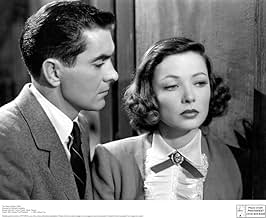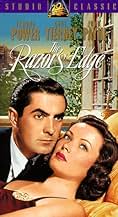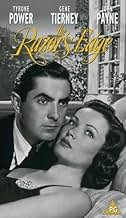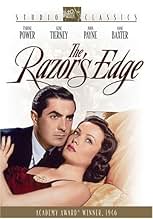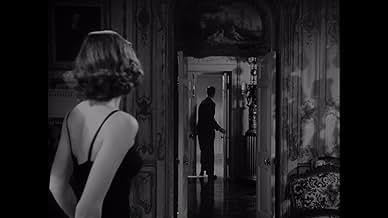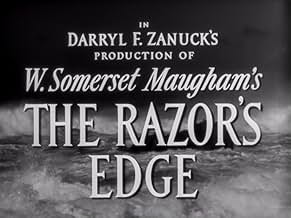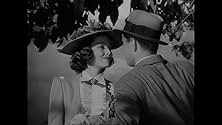NOTE IMDb
7,3/10
7,2 k
MA NOTE
Ajouter une intrigue dans votre langueAn adventuresome young man goes off to find himself and loses his socialite fiancée in the process. But when he returns 10 years later, she will stop at nothing to get him back, even though ... Tout lireAn adventuresome young man goes off to find himself and loses his socialite fiancée in the process. But when he returns 10 years later, she will stop at nothing to get him back, even though she is already married.An adventuresome young man goes off to find himself and loses his socialite fiancée in the process. But when he returns 10 years later, she will stop at nothing to get him back, even though she is already married.
- Réalisation
- Scénario
- Casting principal
- Récompensé par 1 Oscar
- 6 victoires et 3 nominations au total
Dorothy Abbott
- Showgirl
- (non crédité)
George Adrian
- Party Guest
- (non crédité)
Demetrius Alexis
- Abbe
- (non crédité)
Olga Andre
- Minor Role
- (non crédité)
John Ardell
- Banker
- (non crédité)
Frank Arnold
- Miner
- (non crédité)
- …
Juan Arzube
- Minor Role
- (non crédité)
Avis à la une
This has got to be one of my favorite films of all. It ranks in my books up there with PLACE IN THE SUN, REAP THE WILD WIND and THE HURRICANE.
Made in the 40s by 20th Century Fox and Producer Darryl F. Zanuck, it stars Tyrone Power as Larry Farrell, a man on a journey to find the values of life. This fascinating journey takes him all over the world until he reaches a summit in India and there he meets a Holy Man, superbly played by Cecil Humphreys, who helps him understand his questions and then sends him back to the real world where he must then take his place in life. Based on the 1943 book of the same name, by W. Somerset Maugham, it does the story justice with the help of Lamar Trotti in transferring it to the screen. I read the book before seeing the film and was not disappointed. Congratulations also goes to director, Edmound Goulding for bringing the truth of the book to life.
Other noteworthy performances were delivered by the lovely Gene Tierney, as Isabel, again in Cassini dresses, and yet another co-starring Tyrone Power film; John Payne, as Gray, in a different type of role as Miss Tierney's husband, Anne Baxter, as the doomed Sophie, in her Academy Award performance, and was she excellent, Clifton Webb as Elliott Templeton, another of Webb's limp-wristed performances and another Academy Award nomination. Herbert Marshall as Maugham himself. Did anyone get the "gay" relationship between he and Templeton? Then there's Lucile Watson, Frank Gilmore and the delightful Elsa Lanchester in supporting roles. I liked Fritz Kortner as Kosti, the de-frocked priest Larry meets at a bar when he is working the mines.
Ray Dorey along with Alfred Newman wrote the theme song "Mam'selle" for the film. This is the best of the times. You can't get better. Power was superb in this. He was an underrated actor because he was such a handsome man. Yet, his abilities as an actor were terrific. He brought the intelligence of Maugham's writing to focus. Miss Baxter showed you the stuff good performers are made of with her shaded performance in this film. Also watch Marshall's reactions. His eyes are fantastic. They way his looks go from actor to actor. And look for the gay undertones between he and Clifton Webb as the eccentric uncle who delves in the upper crust life. Even to the extreme of having a coat of arms embroidered on his underwear. In the final minutes of the film Marshall speaks to Isabel after Larry leaves her for good, saying, "Goodness is, after all, the greatest force in the world . . .and he's got it." This speaks for the film and it's greatness. I think Marshall should have been nominated for his underplayed performance. He is credited with many fine roles in his career. See this classic. It's on VHS. Not to be confused with the pale remake with Bill Murray.
Made in the 40s by 20th Century Fox and Producer Darryl F. Zanuck, it stars Tyrone Power as Larry Farrell, a man on a journey to find the values of life. This fascinating journey takes him all over the world until he reaches a summit in India and there he meets a Holy Man, superbly played by Cecil Humphreys, who helps him understand his questions and then sends him back to the real world where he must then take his place in life. Based on the 1943 book of the same name, by W. Somerset Maugham, it does the story justice with the help of Lamar Trotti in transferring it to the screen. I read the book before seeing the film and was not disappointed. Congratulations also goes to director, Edmound Goulding for bringing the truth of the book to life.
Other noteworthy performances were delivered by the lovely Gene Tierney, as Isabel, again in Cassini dresses, and yet another co-starring Tyrone Power film; John Payne, as Gray, in a different type of role as Miss Tierney's husband, Anne Baxter, as the doomed Sophie, in her Academy Award performance, and was she excellent, Clifton Webb as Elliott Templeton, another of Webb's limp-wristed performances and another Academy Award nomination. Herbert Marshall as Maugham himself. Did anyone get the "gay" relationship between he and Templeton? Then there's Lucile Watson, Frank Gilmore and the delightful Elsa Lanchester in supporting roles. I liked Fritz Kortner as Kosti, the de-frocked priest Larry meets at a bar when he is working the mines.
Ray Dorey along with Alfred Newman wrote the theme song "Mam'selle" for the film. This is the best of the times. You can't get better. Power was superb in this. He was an underrated actor because he was such a handsome man. Yet, his abilities as an actor were terrific. He brought the intelligence of Maugham's writing to focus. Miss Baxter showed you the stuff good performers are made of with her shaded performance in this film. Also watch Marshall's reactions. His eyes are fantastic. They way his looks go from actor to actor. And look for the gay undertones between he and Clifton Webb as the eccentric uncle who delves in the upper crust life. Even to the extreme of having a coat of arms embroidered on his underwear. In the final minutes of the film Marshall speaks to Isabel after Larry leaves her for good, saying, "Goodness is, after all, the greatest force in the world . . .and he's got it." This speaks for the film and it's greatness. I think Marshall should have been nominated for his underplayed performance. He is credited with many fine roles in his career. See this classic. It's on VHS. Not to be confused with the pale remake with Bill Murray.
The Razor's Edge (1946)
A stately, dramatic, richly nuanced film about love, true love, and the love of life. It's about what matters, and what doesn't, in a high society world George Cukor could have filmed, but this is by director Edmund Goulding, coming off of a series of war films, and with the great Grand Hotel from 1932 in his trail. Some people will find this a touch stiff or slow, or rather too nuanced, but I think none of the above at all. It has the richness of the Somerset Maugham novel it is based on, and Goulding had just filmed (the same year) Of Human Bondage, another Maugham novel. In both cases, the writer contributed to the screenplay, and the combination of the two of them seems really perfect.
Tyrone Power is an interesting lead man, as the idealistic and handsome Larry Darrell, and in some ways his restraint and almost studied dullness at times is maybe what the film needs for its rich, calm trajectory through the twenty years it covers. He's as stable and "good" as the wise, knowing figure of the author, who appears in the form of actor Herbert Marshall. Gene Tierney as Power's counterpart and eventually counterpoint plays the spoiled woman with cool, dramatic perfection. She's got energy and edge and beauty from every angle, and she maintains just that slightest duplicity in every scene, so you are kept on your toes.
The only forced and almost laughable section is the one that demands we think profound thoughts...the guru in India being guru to our hero. Unfortunately, it lasts for fifteen minutes, and though there is a spiritual necessity to the experience he has there, this spiritual aspect is implied just as fully in the worldly scenes that follow. I can picture a far better movie without this insert, and I can picture the director picturing it, too. Someone knows why it got patched in, and for whom, but this is what we have.
It has to be said the filming, as conservative as it is in many ways, is spot-on gorgeous. The brightly lit, ornamented, busy sets are actually inhabited by the camera, and the figures move together not only across the field, but front to back as well, in triangles and curves of visual activity, yet with fluidity--it's all contained and lyrically delicious. This is done without ostentatious mood, without sharp angles and bold lighting, but instead with spatial arrangements, always full, no emptiness, no great shadows, always something more to see. A great example, easy to find, is the very last scene, just before the shot on the boat when the end titles run. Watch how Marshall walks the long way around Tierney, and then she walks around him, and the camera keeps them framed side to side, front to back. It's nothing short of brilliant, and yet, in style, so different than say Toland doing Kane or, at another extreme, Ozu doing Tokyo Story. But no less spectacular.
At one point, a minor character, a defrocked priest, says to Darrell in a working class bar, "You sound like a very religious man who does not believe in God." The movie is really about godliness, or what Maugham calls "goodness" in the end. And some people have it, and share it, and make the world better, God or no God.
A stately, dramatic, richly nuanced film about love, true love, and the love of life. It's about what matters, and what doesn't, in a high society world George Cukor could have filmed, but this is by director Edmund Goulding, coming off of a series of war films, and with the great Grand Hotel from 1932 in his trail. Some people will find this a touch stiff or slow, or rather too nuanced, but I think none of the above at all. It has the richness of the Somerset Maugham novel it is based on, and Goulding had just filmed (the same year) Of Human Bondage, another Maugham novel. In both cases, the writer contributed to the screenplay, and the combination of the two of them seems really perfect.
Tyrone Power is an interesting lead man, as the idealistic and handsome Larry Darrell, and in some ways his restraint and almost studied dullness at times is maybe what the film needs for its rich, calm trajectory through the twenty years it covers. He's as stable and "good" as the wise, knowing figure of the author, who appears in the form of actor Herbert Marshall. Gene Tierney as Power's counterpart and eventually counterpoint plays the spoiled woman with cool, dramatic perfection. She's got energy and edge and beauty from every angle, and she maintains just that slightest duplicity in every scene, so you are kept on your toes.
The only forced and almost laughable section is the one that demands we think profound thoughts...the guru in India being guru to our hero. Unfortunately, it lasts for fifteen minutes, and though there is a spiritual necessity to the experience he has there, this spiritual aspect is implied just as fully in the worldly scenes that follow. I can picture a far better movie without this insert, and I can picture the director picturing it, too. Someone knows why it got patched in, and for whom, but this is what we have.
It has to be said the filming, as conservative as it is in many ways, is spot-on gorgeous. The brightly lit, ornamented, busy sets are actually inhabited by the camera, and the figures move together not only across the field, but front to back as well, in triangles and curves of visual activity, yet with fluidity--it's all contained and lyrically delicious. This is done without ostentatious mood, without sharp angles and bold lighting, but instead with spatial arrangements, always full, no emptiness, no great shadows, always something more to see. A great example, easy to find, is the very last scene, just before the shot on the boat when the end titles run. Watch how Marshall walks the long way around Tierney, and then she walks around him, and the camera keeps them framed side to side, front to back. It's nothing short of brilliant, and yet, in style, so different than say Toland doing Kane or, at another extreme, Ozu doing Tokyo Story. But no less spectacular.
At one point, a minor character, a defrocked priest, says to Darrell in a working class bar, "You sound like a very religious man who does not believe in God." The movie is really about godliness, or what Maugham calls "goodness" in the end. And some people have it, and share it, and make the world better, God or no God.
This film, and the book on which it is based, made strong impressions on me in my youth, but even more so now that I am past middle age. A magnificent cast - Tyrone Power, Gene Tierney, Anne Baxter, Clifton Webb, John Payne, Herbert Marshall, help to tell the story of a man who walks "in another man's shoes" -- and totally to his own drummer -- after the first world war. In his quest for spirituality and goodness, he is at odds with the materialism and obsession around him. The different layers of "The Razor's Edge" demand attention: Larry's physical desire for Isabel, a woman it turns out he doesn't even know; Isabel's cold-heartedness and desire to possess Larry; and Larry's search for the meaning of life, while the people he loves disintegrate around him from lack of values or hope. These are all seen through the eyes of Somerset Maugham, played by Marshall. Larry's final confrontation scene with Isabel (Tierney) about Sophie (Baxter) is bone-chilling -- Power, who had a tendency to be sometimes stiff and a bit removed from his material, uses that flaw to excellent advantage as Larry Darrell. It's not a showy role, but he's wonderful, and he's reading of poetry in Sophie's room is unforgettable.
Highly recommended.
Highly recommended.
Old Hollywood was always in trouble when dealing with Deep Think. That's because of the medium's commercial nature. When flirting with spiritual or religious beliefs, the studios simply didn't want to risk offending potential ticket buyers. So, when dealing with Deep Think (not their many biblical epics which were unabashedly Christian), the studios compromised to the point of absurdity by either flattening out the message or trivializing it. Here it's trivialized. After all, who's against Goodness. As a result, we wait 145-minutes to find out that, yes, Goodness is in fact a good and noble thing, and with that, Larry (Power) is on his way to enlightenment. And naturally, no one's offended, except maybe those who had expected something more.
Of course, the profundity is wrapped in lavishly mounted studio soap opera, with two of Hollywood's most beautiful people surrounded by whirling hosts of well-clothed extras. In fact, that opening ballroom scene is a marvel of orchestrated staging as the characters are introduced by serially playing off one another.
At the spectrum's other end, however, is that dreadful monastery scene with its painted mountain backdrop and facile dialog. Flattening the import of that pivotal scene are the repeated references to god as though that's where all paths must inevitably lead. And that's along with the spectacular alpine vistas fairly shouting celestial light from a heavenly above. I'm sure all that window dressing comforted nervous audiences who could then wink at Larry's spiritual quest and not feel the least bit threatened. But it also reduced a profound subject to a superficial level.
Another area that gets a Hollywood treatment are values and class, always tricky topics for an industry backed by Wall Street. The movie goes to pains circulating Larry among the gilded elite of Chicago as epitomized by the petulantly snobbish Templeton (Webb) and the selfishly insulated Isabel (Tierney). But, the elite's values are clearly materialistic, a spiritual dead-end in Larry's view as he heads off to learn from suffering with the working class. The screenplay thus sets up an implicit critique of the gilded class and the values that guide them. Well and good. But then the screenwriters can't seem to decide what to do with this point of view; after all, that's another touchy topic among audiences, especially coming so soon after the societal upheaval of the 1930's.
As a result, Larry never really criticizes the peer group he's been a part of, never really explains, that is, why he sees his social class as a spiritual dead-end, which of course would delve into a socially touchy subject. Nor, for that matter, does Larry explain why "salvation" lies through sharing a working class experience. We're left, I guess, to suppose the answer has to do with the suffering caused by hard physical labor and poor pay this class must endure. This subtext, however, is never really brought to the surface and remains unresolved at movie's end. Thus, big studio TCF and its head honcho, producer Zanuck, nibble around a second tinderbox topic, tantalizing us but never really delivering.
The movie does have a definite upside. For one, it's exquisitely well photographed, compensating somewhat for the 2-hour-plus run time. At the same time, the ballroom scenes are especially well choreographed and lavishly upholstered, creating an impressive air of wealth and breeding that makes Larry's renunciation a genuine material sacrifice. Then too, there's Webb's lively version of an unregenerate snob, a character he could do to waspish perfection. Also, Marshall's quietly observant author provides a needed contemplative note. However, in the film's pivotal role Power fails to provide the needed depth his character requires, or as another reviewer observes, Larry is pretty much the same after his trip to India as he was before. Fortunately, Power would later find that depth in Nightmare Alley (1947).
All in all, the movie remains an overlong visual treat that fortunately includes the exquisite Tierney. But as one might expect from old Hollywood, the film fails crucially at coming to grips with its two overriding themes—spirituality and class. As a result, two of life's most important questions are given unchallenging treatment. In short, here as elsewhere, where Deep Think is concerned, commercialism precedes all else.
Of course, the profundity is wrapped in lavishly mounted studio soap opera, with two of Hollywood's most beautiful people surrounded by whirling hosts of well-clothed extras. In fact, that opening ballroom scene is a marvel of orchestrated staging as the characters are introduced by serially playing off one another.
At the spectrum's other end, however, is that dreadful monastery scene with its painted mountain backdrop and facile dialog. Flattening the import of that pivotal scene are the repeated references to god as though that's where all paths must inevitably lead. And that's along with the spectacular alpine vistas fairly shouting celestial light from a heavenly above. I'm sure all that window dressing comforted nervous audiences who could then wink at Larry's spiritual quest and not feel the least bit threatened. But it also reduced a profound subject to a superficial level.
Another area that gets a Hollywood treatment are values and class, always tricky topics for an industry backed by Wall Street. The movie goes to pains circulating Larry among the gilded elite of Chicago as epitomized by the petulantly snobbish Templeton (Webb) and the selfishly insulated Isabel (Tierney). But, the elite's values are clearly materialistic, a spiritual dead-end in Larry's view as he heads off to learn from suffering with the working class. The screenplay thus sets up an implicit critique of the gilded class and the values that guide them. Well and good. But then the screenwriters can't seem to decide what to do with this point of view; after all, that's another touchy topic among audiences, especially coming so soon after the societal upheaval of the 1930's.
As a result, Larry never really criticizes the peer group he's been a part of, never really explains, that is, why he sees his social class as a spiritual dead-end, which of course would delve into a socially touchy subject. Nor, for that matter, does Larry explain why "salvation" lies through sharing a working class experience. We're left, I guess, to suppose the answer has to do with the suffering caused by hard physical labor and poor pay this class must endure. This subtext, however, is never really brought to the surface and remains unresolved at movie's end. Thus, big studio TCF and its head honcho, producer Zanuck, nibble around a second tinderbox topic, tantalizing us but never really delivering.
The movie does have a definite upside. For one, it's exquisitely well photographed, compensating somewhat for the 2-hour-plus run time. At the same time, the ballroom scenes are especially well choreographed and lavishly upholstered, creating an impressive air of wealth and breeding that makes Larry's renunciation a genuine material sacrifice. Then too, there's Webb's lively version of an unregenerate snob, a character he could do to waspish perfection. Also, Marshall's quietly observant author provides a needed contemplative note. However, in the film's pivotal role Power fails to provide the needed depth his character requires, or as another reviewer observes, Larry is pretty much the same after his trip to India as he was before. Fortunately, Power would later find that depth in Nightmare Alley (1947).
All in all, the movie remains an overlong visual treat that fortunately includes the exquisite Tierney. But as one might expect from old Hollywood, the film fails crucially at coming to grips with its two overriding themes—spirituality and class. As a result, two of life's most important questions are given unchallenging treatment. In short, here as elsewhere, where Deep Think is concerned, commercialism precedes all else.
Darryl Zanuck gave in to Tyrone Power's request for some serious acting roles and not another costume part in his first post World War II film after returning from the Marines. The Razor's Edge is a bit overlong, but Tyrone Power and the rest of the cast is shown to best advantage.
The Razor's Edge is the story about a returning World War I veteran's quest for spiritual meaning in his life. Author W. Somerset Maugham wrote this during the 30s and his themes then found a good audience in 1946. He appears in the movie, played by Herbert Marshall, and it is his eyes through which we see the action unfold.
It starts at a party in the Midwest at the beginning of the Roaring 20s. All the principal characters are introduced there including Larry Darrell, played by Power, who wants to postpone his engagement to Gene Tierney. Power explains about his lack of spiritual fulfillment and his desire to do some global soul searching. Tierney's not happy, but she thinks all he wants to do is sow some wild oats and she reluctantly acquiesces.
A year later she's in Paris and she finds Ty living on the fringe and she realizes he was serious. Now Tierney is hopping mad so she marries steady and reliable John Payne. Now the plot unfolds.
As I've said in other reviews of his films Power was either the straight arrow hero or a hero/heel type. He's a straight arrow in this one as noble as you can get without crossing over into Dudley DooRightism.
Gene Tierney had essayed bitchiness in Leave Her to Heaven and she refines it to a high art here. Even though she's married to Payne, she still has a yen for Ty and her machinations are what drives the rest of the story.
John Payne, I have always been convinced was brought to 20th Century Fox as a singing Tyrone Power for musicals. So it is interesting to see them together. It is unfortunate that Payne wasn't given a better role because his part as Tierney's husband who loses his fortune in the Stock Market Crash wasn't better written. Payne proved on a lot of occasions he was a capable enough actor to handle more complex parts.
Clifton Webb plays fussy Uncle Elliott Templeton and got an Oscar Nomination, losing to Harold Russell in the Best Years of Our Lives. Webb was the closest thing for years to an out gay actor and a lot of his roles reflect that part of him, like this one. My favorite scene is after Ty Power goes to India and in that Shangri La like lamasery feels he has been made spiritually aware, with the symphonic crescendos rising, the action cuts away to a Paris tailor shop where Clifton Webb is complaining that the tassel on his robe doesn't sway, but that it bobbles.
Anne Baxter won a Best Supporting Actress Award for a playing a friend of Tierney's in the mid west. Baxter is a happy girl, marrying a young man she's deeply in love with. Her husband and baby are killed in an automobile crash. Baxter's study of physical and moral decline and degradation is some of her best work, maybe even better than Eve Harrington in All About Eve.
The story is a bit dated now, but it's still a fine film and one that shows Tyrone Power capable of far more than swashbuckling.
The Razor's Edge is the story about a returning World War I veteran's quest for spiritual meaning in his life. Author W. Somerset Maugham wrote this during the 30s and his themes then found a good audience in 1946. He appears in the movie, played by Herbert Marshall, and it is his eyes through which we see the action unfold.
It starts at a party in the Midwest at the beginning of the Roaring 20s. All the principal characters are introduced there including Larry Darrell, played by Power, who wants to postpone his engagement to Gene Tierney. Power explains about his lack of spiritual fulfillment and his desire to do some global soul searching. Tierney's not happy, but she thinks all he wants to do is sow some wild oats and she reluctantly acquiesces.
A year later she's in Paris and she finds Ty living on the fringe and she realizes he was serious. Now Tierney is hopping mad so she marries steady and reliable John Payne. Now the plot unfolds.
As I've said in other reviews of his films Power was either the straight arrow hero or a hero/heel type. He's a straight arrow in this one as noble as you can get without crossing over into Dudley DooRightism.
Gene Tierney had essayed bitchiness in Leave Her to Heaven and she refines it to a high art here. Even though she's married to Payne, she still has a yen for Ty and her machinations are what drives the rest of the story.
John Payne, I have always been convinced was brought to 20th Century Fox as a singing Tyrone Power for musicals. So it is interesting to see them together. It is unfortunate that Payne wasn't given a better role because his part as Tierney's husband who loses his fortune in the Stock Market Crash wasn't better written. Payne proved on a lot of occasions he was a capable enough actor to handle more complex parts.
Clifton Webb plays fussy Uncle Elliott Templeton and got an Oscar Nomination, losing to Harold Russell in the Best Years of Our Lives. Webb was the closest thing for years to an out gay actor and a lot of his roles reflect that part of him, like this one. My favorite scene is after Ty Power goes to India and in that Shangri La like lamasery feels he has been made spiritually aware, with the symphonic crescendos rising, the action cuts away to a Paris tailor shop where Clifton Webb is complaining that the tassel on his robe doesn't sway, but that it bobbles.
Anne Baxter won a Best Supporting Actress Award for a playing a friend of Tierney's in the mid west. Baxter is a happy girl, marrying a young man she's deeply in love with. Her husband and baby are killed in an automobile crash. Baxter's study of physical and moral decline and degradation is some of her best work, maybe even better than Eve Harrington in All About Eve.
The story is a bit dated now, but it's still a fine film and one that shows Tyrone Power capable of far more than swashbuckling.
Le saviez-vous
- AnecdotesThere were 89 different sets built for the film, which had the longest shooting schedule for any film at the studio to that date. According to some news items, the film broke all previous studio box office records.
- GaffesAfter a promising beginning, in which the clothes and hairstyles of 1919 are pleasantly and reasonably accurately interpreted, as soon as it gets to 1920, then on to 1930, and beyond, Gene Tierney's hairstyle is in an unchanging, although very attractive, 1946 mode, and all of her clothes, designed by husband Oleg Cassini, except for lower hemlines, are strictly 1946, complete with the ubiquitous shoulder pads of that era. Anne Baxter's ensembles look more like Tierney/Cassini rejects, an unhappy compromise between opposing styles.
- Crédits fousWhen the screenplay credits are shown, a curious symbol appears near W. Somerset Maugham's name. It's a symbol meant to ward off the evil eye, and it more often than not appeared on the covers of many of Maugham's novels.
- ConnexionsFeatured in 20th Century-Fox: The First 50 Years (1997)
Meilleurs choix
Connectez-vous pour évaluer et suivre la liste de favoris afin de recevoir des recommandations personnalisées
- How long is The Razor's Edge?Alimenté par Alexa
Détails
- Date de sortie
- Pays d’origine
- Langues
- Aussi connu sous le nom de
- El filo de la navaja
- Lieux de tournage
- Denver, Colorado, États-Unis(2nd unit exteriors, backgrounds, mountains)
- Société de production
- Voir plus de crédits d'entreprise sur IMDbPro
Box-office
- Budget
- 1 200 000 $US (estimé)
- Durée2 heures 25 minutes
- Couleur
- Rapport de forme
- 1.33 : 1
Contribuer à cette page
Suggérer une modification ou ajouter du contenu manquant


